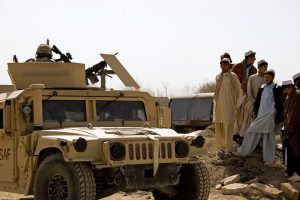[Original by
Hiroshi TANIYAMA, JVC’s President (August 23, 2016); Translated by Y. Nakamura]
Modern war is protracted one
Most of modern wars take the form of “anti-terrorism war”. An “anti-terrorism war” does not have a distinct front line of fight, and cannot always differentiate between a combatant and noncombatant. A characteristic of modern war is meant to be “a war fought among residents”. Consequently, civilians would be more liable to damages. Furthermore, it is very difficult to negotiate ending the war because the side of “terrorist” rarely has a chain of command like a state does. Therefore, the war is likely to be protracted.
Learning from the case of Afghanistan
In Afghanistan, where JVC has been providing medical assistance, the allies concerned including the US forces had been undertaking an anti-terrorism war to destroy Taliban. Simultaneously, International Security Assistance Force (ISAF), multi-national forces dispatched by UN, had been doing operations for settlement to help the government of Afghanistan. Two foreign armies, which had different purposes and chains of command, lost boundary lines in military operations and got bogged down in a war involving residents. In 2006, when I was assigned in Afghanistan, two armies were combined, and ISAF, with the aim of supporting at the back, was exposed to attacks by enemies mixed with residents. It made them escalate from defense to counterattack, and from counterattack to excessive attack, and they killed lot of innocent residents.
Security Laws were approved and Japan is being drawn into a war
Last year, the Government party forced the Diet to approve the Security Laws. What activities Self-Defense Forces (SDF) ought to participate in, as stipulated in the Security Laws, means that SDF must take a step forward towards action, whichever word is used to make an excuse for it. They engage in a battle with armed forces and suppress them in accordance with “Kaketsuke-Keigo”. Also, they conduct “support at the back” of other countries’ forces in accordance with enforcement of International Peace Support Act and Important Influencing Situations Act. Those activities make SDF the party concerned in conflict. Once they participated in a battle, it would involve residents and produce victims. In Afghanistan, many foreign forces were stationed under the name of “support at the back”. Most of them were involved in battles and so excessively attacked as to result in the killing of residents. Afghan NGOs, which were well informed of these situations, raised a voice strongly opposing to the Security Laws of Japan.
Which diplomacy should Japan choose?
“Anti-terrorism war” is endless one. US and member countries of NATO are trying to involve Japan in this war, and Japan is letting herself be involved in it. But its limit had been made clear in the “anti-terrorism war” in Afghanistan and Iraq. However powerful forces were used, they could not solve conflicts but only made situations bogged down.
Japan has not used force even in such situations but has only done support and assistance. That is the reason why it has received respect as a “symbol of peace”. Peace in Afghanistan and Iraq has not been achieved. It is not because Japan had not used force like “ordinary country”. Japan, a country that does not use force to solve conflict, has chosen another way. It is neutral mediation among parties concerned in conflict and neutral civic assistance. Now, we have to recognize things that Japan is about to lose and think of things that Japan can do only by herself. Japan is now on the verge of losing an asset of respect in the international society that we have been fostering on the basis of pacifism for 70 years after the end of World War II. The function that Japan should serve in time of endless war is to solve conflicts by no use of force.
Share This:
